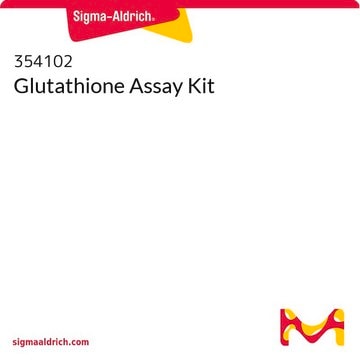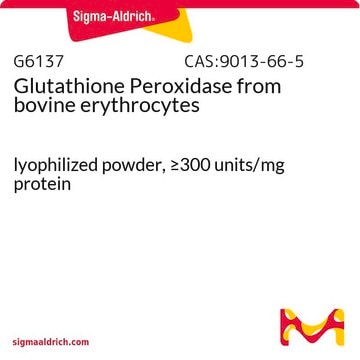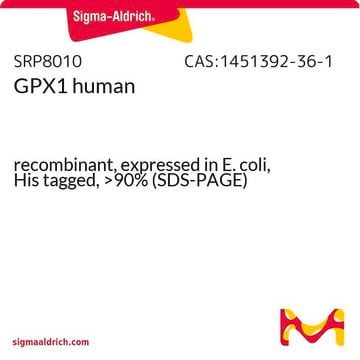CGP1
Glutathione Peroxidase Cellular Activity Assay Kit
Sufficient for 100 colorimetric tests
Synonym(s):
Cellular glutathione peroxidase, c-GPx
About This Item
Recommended Products
Quality Level
usage
sufficient for 100 tests
shelf life
Kit is stable for 24 months when unopened.
detection method
colorimetric
shipped in
wet ice
storage temp.
−20°C
General description
Suitability
Principle
Other Notes
Kit Components Only
- tert-Butyl hydroperoxide 1 mL
related product
Signal Word
Danger
Hazard Statements
Precautionary Statements
Hazard Classifications
Acute Tox. 2 Inhalation - Acute Tox. 3 Dermal - Acute Tox. 4 Oral - Aquatic Chronic 2 - Eye Dam. 1 - Flam. Liq. 3 - Muta. 2 - Org. Perox. F - Skin Corr. 1C - Skin Sens. 1 - STOT SE 3
Target Organs
Respiratory system
Storage Class Code
5.2 - Organic peroxides and self-reacting hazardous materials
Certificates of Analysis (COA)
Search for Certificates of Analysis (COA) by entering the products Lot/Batch Number. Lot and Batch Numbers can be found on a product’s label following the words ‘Lot’ or ‘Batch’.
Already Own This Product?
Find documentation for the products that you have recently purchased in the Document Library.
Customers Also Viewed
Articles
Cellular oxidative stress is countered by enzymatic scavengers and antioxidant modulators against reactive oxygen species damage.
Cellular oxidative stress is countered by enzymatic scavengers and antioxidant modulators against reactive oxygen species damage.
Cellular oxidative stress is countered by enzymatic scavengers and antioxidant modulators against reactive oxygen species damage.
Cellular oxidative stress is countered by enzymatic scavengers and antioxidant modulators against reactive oxygen species damage.
Our team of scientists has experience in all areas of research including Life Science, Material Science, Chemical Synthesis, Chromatography, Analytical and many others.
Contact Technical Service










